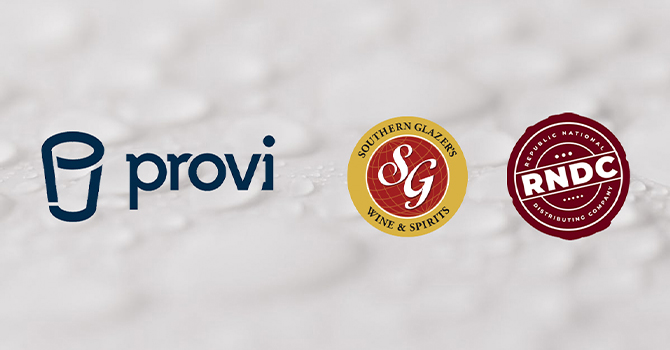
U.S. District Court Judge Nancy L. Maldonado ruled that Provi’s lawsuit alleging Southern and RNDC illegally stifled competition related to the alcohol industry can proceed and move into discovery.
Provi filed a complaint in March 2022 against the two companies – two of the largest wine and spirits distributors in the country – alleging the defendants worked to “boycott, disparage and tortiously interfere with Provi’s business.”
Southern Glazer’s and RNDC used the Provi platform to fulfill more than 120,000 alcohol orders totaling nearly $200 million in revenue between 2016 and 2021, according to the original filing. In 2019, the two companies each introduced their own B2B e-commerce ordering services, SG Proof (Southern Glazer’s) and eRNDC (RNDC). The companies allegedly continued to accept orders through Provi for two years after those launches, then “nearly simultaneously” announced they would no longer use the marketplace.
Provi claims the two distributors created a coordinated campaign against its service, blocking the platform’s email domain, rejecting orders and “threaten[ing] its own sales associates with termination or discipline if they failed to comply.”
Southern Glazer’s and RNDC filed a motion to dismiss the lawsuit in June, describing Provi as a disgruntled “online matchmaker” whose business relies on distributors. The defendants have denied any boycott or campaign against Provi, and said the company cannot prove its “conclusory allegations” that the decision to stop using Provi “undermine[d] competition” in the marketplace.
However, Judge Maldonado’s ruling today denied the distributors’ motion to dismiss “in its entirety.” She wrote that Provi has “adequately alleged an agreement in violation” of the Sherman Ant-Trust Act. The 60-page ruling states that “Provi plausibly alleges that Southern leverages its substantial market shares and its exclusive rights to distribute must-have brands to force retailers to use Proof if retailers want to order products online.”
Maldonado also noted the impact of Southern and RNDC’s alleged anti-competitive practices extending across the industry.
“Defendants’ allegedly anticompetitive conduct affects both competitors and customers in the relevant markets, making it even more reasonable to infer that Defendants’ allegedly anticompetitive conduct harms competition in the relevant markets, as opposed to Provi individually,” reads the ruling. “These allegations suggest that any harm stemming from Defendants’ behavior was not limited to Provi alone.”
The complaint was the first of its kind to use a report by the U.S. Department of Treasury assessing the state of competition in the beverage-alcohol industry following an executive order President Joe Biden signed in 2022. Since then, Southern Glazer’s has also been the subject of an FTC investigation for alleged violations of the Robinson-Patman Act, which bars suppliers from offering favorable pricing to larger retailers.
Tennessee Draws Line Against Online Retailers
Five e-commerce businesses will face fines for shipping alcohol direct-to-consumer without a license, a federal court ruled Tuesday.
The court approved a settlement that includes injunctive relief and more than $50,000 in civil penalties levied against online liquor stores, after an investigation by the Tennessee Alcoholic Beverage Commission (TABC) and prosecution by the attorney general’s office.
Tennessee Attorney General Jonathan Skrmetti filed the lawsuit in the U.S. District Court for the Middle District of Tennessee in Nashville last July, seeking to immediately stop “the flow of illegal liquor shipments” through a preliminary and permanent injunction against the companies.
The companies fined include Bottle Buzz, Prime Time Liquors, My Bev Store, The Liquor Bros and Wooden Cork, who in addition to paying civil penalties, have all agreed to cease illegal shipping and acknowledged their violations.
Between late 2022 and early 2023, Tennessee agents placed orders for spirits from those retailers as well as Cask Cartel. In some cases the state issued a cease-and-desist letter, urging companies to stop shipping alcohol into the state, according to the complaint, but orders were still fulfilled. Other stores didn’t receive cease-and-desist letters, but shipped spirits to state agents.
The state sought monetary damages under state law and an injunction to prevent future shipments under the 21st Amendment Enforcement Act, which was also used in July 2020 in Ohio against seven out-of-state shippers, and again in Michigan. The law allows state attorneys general to bring civil actions for injunctive relief against anyone believed to be illegally importing or transporting alcohol within the state.
Advocates against direct-to-consumer shipping, such as the Wine and Spirits Wholesalers of America, argue that the 21st Amendment ensures proper collection of federal and state taxes, product integrity, and restriction of alcohol purchases to drinkers of legal age.
Last year, attorneys speculated that the result in Tennessee could inspire other state cases. Other states could see sting operations like Tennessee, also starting with warnings, said Ryan Malkin, principal attorney at Malkin Law, a Florida-based legal firm serving the alcohol and cannabis beverage industries, and counsel for the American Craft Spirits Association. Retailers then must decide if they want to to take their chances.
“Here, the defendants proceeded to sell into the state after the warning. To resolve the matter, the retailers entered into a relatively nominal penalty as part of a consent order,” he said. “In my opinion, the amount of the fine is not significant enough to deter other retailers who intend to violate the rules in this state or other states.”